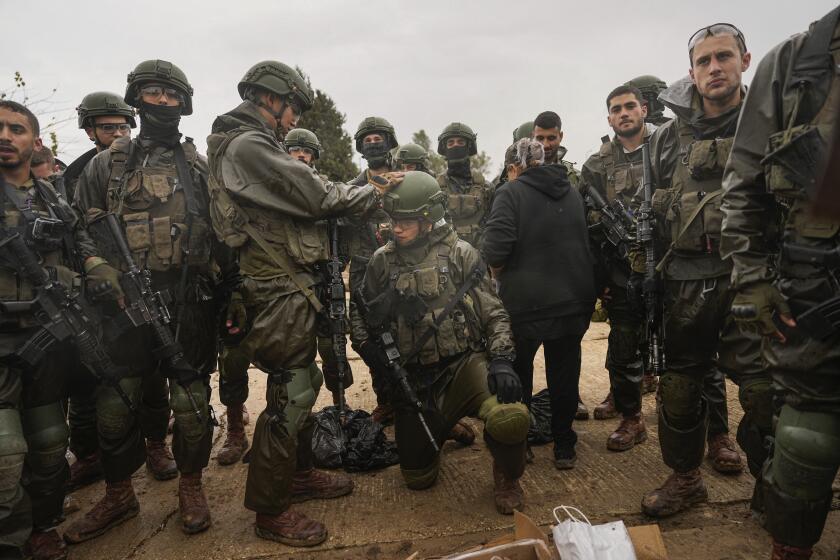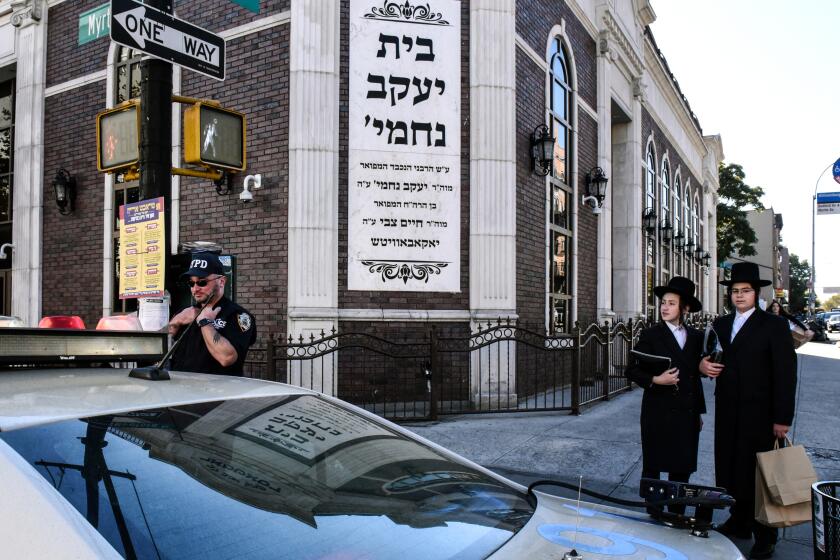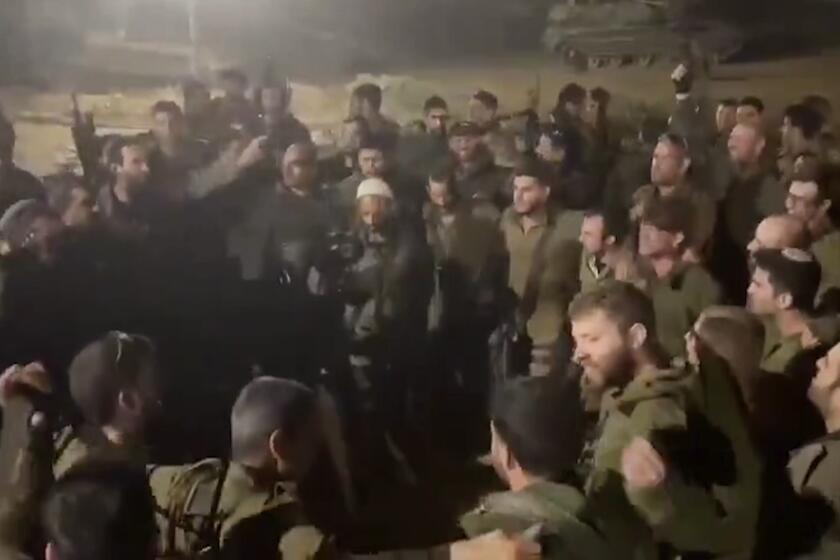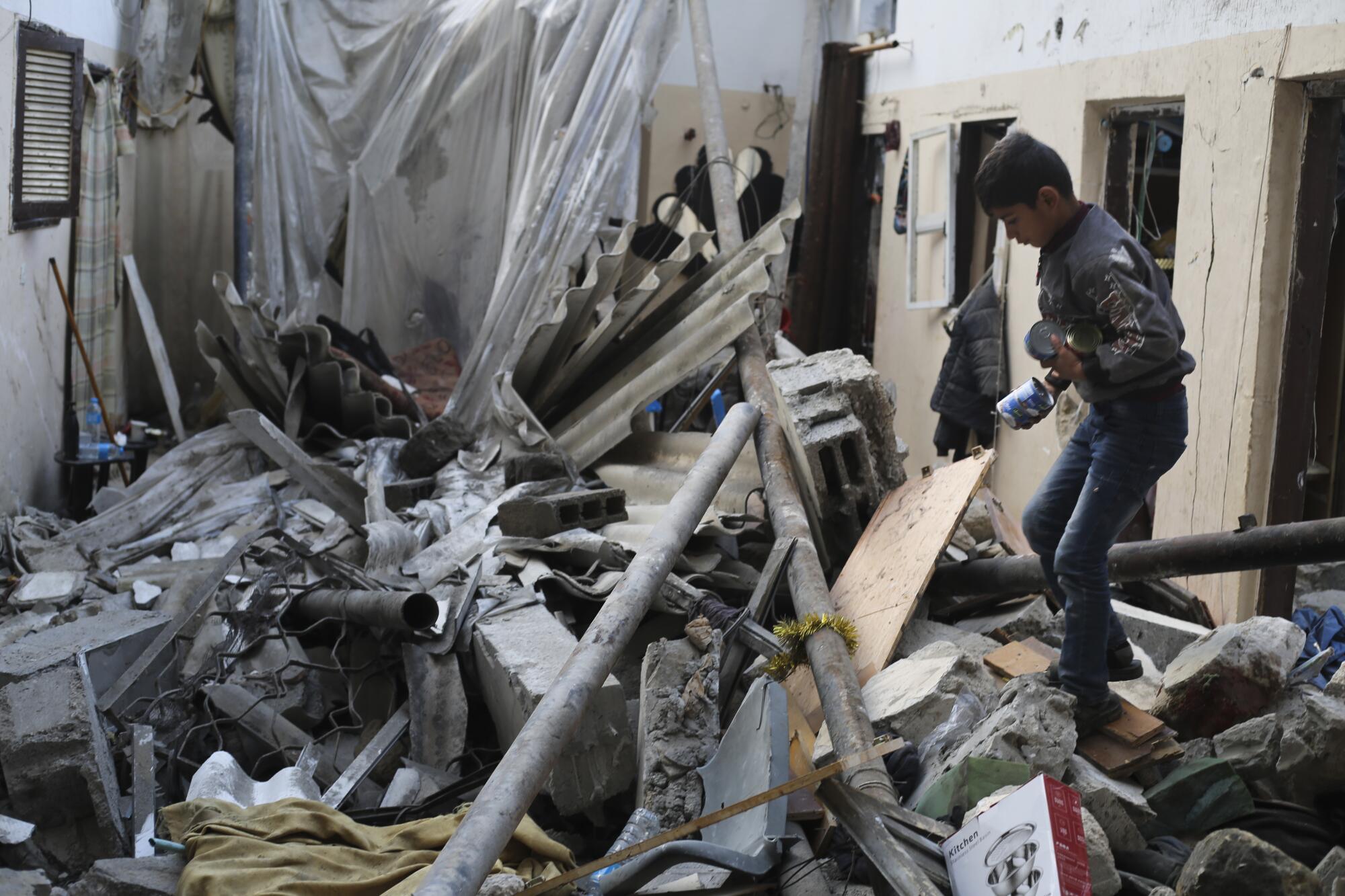
- Share via
RAFAH, Gaza Strip — Israel’s defense minister said Thursday it will take “more than several months” to destroy Hamas, predicting a drawn-out war even as his country and its top ally, the United States, face increasing international isolation and alarm over the devastation from Israel’s campaign in Gaza.
Yoav Gallant’s comments came as U.S. national security advisor Jake Sullivan met with Israeli leaders to discuss a timetable for winding down major combat in the Gaza Strip. Israeli leaders repeated their determination to pursue the military assault until they crush the militant group for its Oct. 7 attack.
The exchange seemed to continue a dynamic the two allies have been locked in for weeks. The Biden administration has shown unease over Israel’s failure to reduce civilian casualties and its plans for the future of Gaza, but the White House continues to offer wholehearted support for Israel with weapons shipments and diplomatic backing.
Meanwhile, aside from small adjustments, Israel has changed little in what has been one of the 21st century’s most devastating military campaigns, with a mounting death toll.
The prime minister of the Palestinian Authority, Mohammad Shtayyeh, said it’s time for the United States to deal more firmly with Israel, particularly on Washington’s calls for postwar negotiations for a two-state solution to the Israeli-Palestinian conflict.
“Now that the United States has talked the talk, we want Washington to walk the walk,” Shtayyeh said in an interview with the Associated Press a day before he and Palestinian Authority President Mahmoud Abbas were to meet with Sullivan.
Sullivan was to visit Ramallah for the meeting, where the men will discuss ongoing efforts to promote stability in the West Bank, according to a Biden administration official who spoke on condition of anonymity because the official was not authorized to discuss the visit, which has not been formally announced.
A deadly Hamas ambush on Israeli troops in Gaza City this week more than 2½ months into a massive air and ground war showed the group’s resilience and called into question whether Israel can defeat it without wiping out the entire territory. The campaign has flattened much of northern Gaza and driven 80% of Gaza’s population of 2.3 million from their homes. Displaced people have squeezed into shelters mainly in the south in a spiraling humanitarian crisis.
Gallant said Hamas has been building military infrastructure in Gaza for more than a decade, “and it is not easy to destroy them. It will require a period of time.”
“It will last more than several months, but we will win, and we will destroy them,” he said.
After talks with Sullivan in Tel Aviv, Israeli Prime Minister Benjamin Netanyahu said he told Israel’s “American friends” that the country was “more determined than ever to continue fighting until Hamas is eliminated — until complete victory.”
White House National Security Council spokesman John F. Kirby said Sullivan talked with Netanyahu about moving to “lower-intensity operations” sometime “in the near future.”
“But I don’t want to put a time stamp on it,” he said.
Earlier this week, President Biden said Israel was losing international support because of its “indiscriminate bombing.” U.S. officials have been telling Israel for several weeks that the country’s window is closing for concluding major combat operations in Gaza without losing even more support internationally.
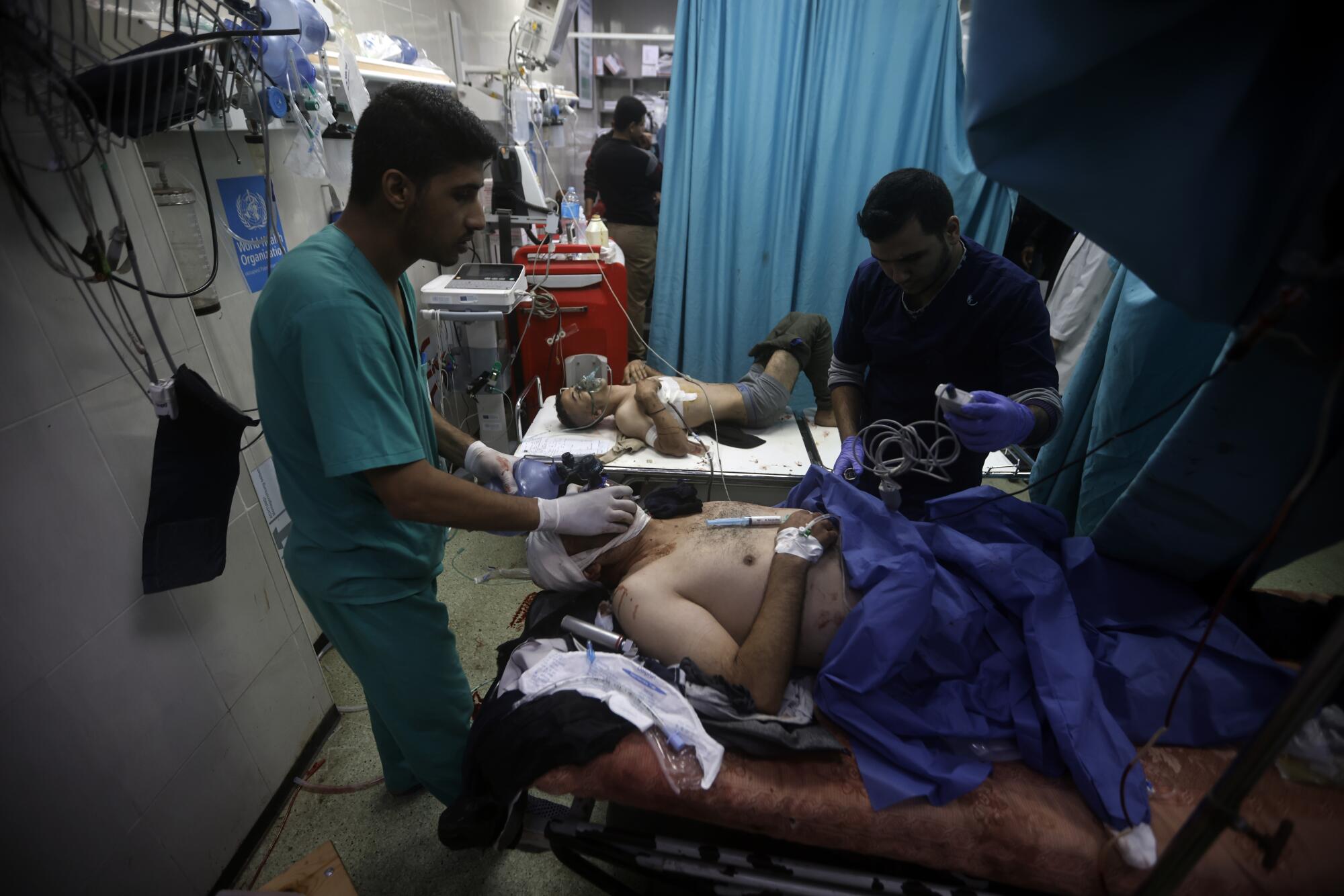
The ambush took place Tuesday in the dense Gaza City neighborhood of Shajaiya, which was also the scene of a major battle during the 2014 war between Israel and Hamas. The dead included two high-ranking officers. Israel says 116 soldiers have been killed in its ground offensive, which began Oct. 27.
After Hamas’ attack, the U.S. pledged full support for Israel. Now, as the death toll in Gaza skyrockets, President Biden is trying to rein in Netanyahu.
Heavy fighting has raged for days in Shajaiya and other areas in and around eastern Gaza City that were encircled earlier in the war. Tens of thousands of people remain in the north despite repeated evacuation orders, saying they don’t feel safe anywhere in Gaza or fear they may never return to their homes if they leave.
The Palestinian phone and internet provider Paltel said Thursday that all communication services across the Gaza Strip were cut off amid the ongoing fighting, severing the besieged territory from the outside world.
Israel’s air and ground assault was launched in response to Hamas’ unprecedented attack on southern Israel on Oct. 7 in which at least 1,200 people, mostly civilians, were killed, Israeli authorities say, and some 240 others were kidnapped. Since then, more than 18,600 Palestinians have been killed, according to the Health Ministry in Hamas-run Gaza.
The ministry does not differentiate between civilian and combatant deaths. Its latest count did not specify how many were women and children, but they have consistently made up around two-thirds of the dead in previous tallies. Thousands more are missing and feared dead beneath the rubble.
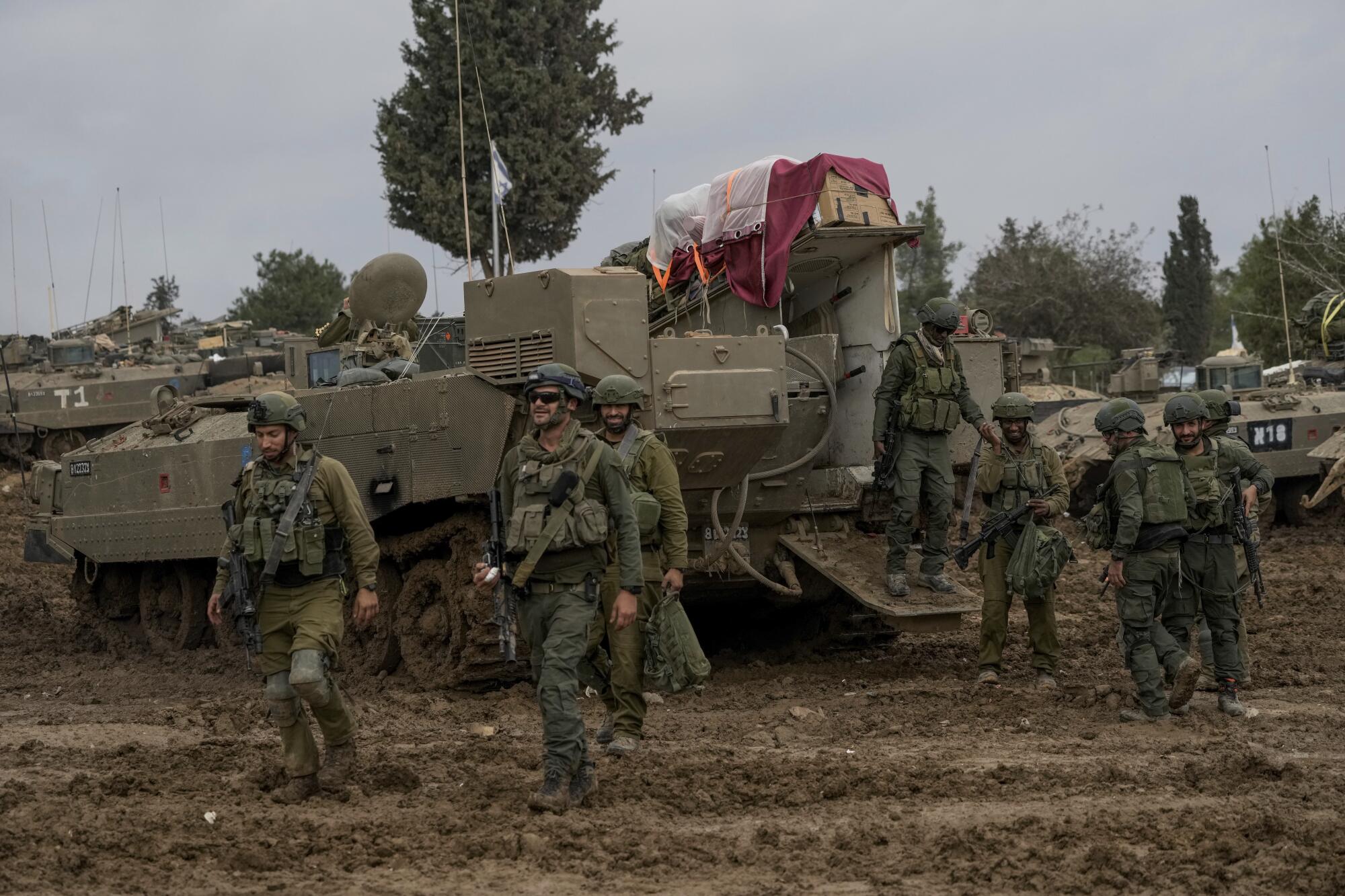
Nearly 1.9 million Palestinians have been driven from their homes, with most seeking refuge in the south, even as Israel has continued to strike what it says are militant targets in all parts of the territory.
The Israeli military released video Thursday showing Israeli troops leading a line of dozens of men with their hands above their heads out of a damaged building it said was the Kamal Adwan Hospital in the north Gaza town of Beit Lahia. Men brought out four assault rifles and set them on the street along with several ammunition magazines.
In the video, an Israeli commander said that militants had fired on troops from the hospital and that troops were evacuating those inside while detaining suspected militants. The claims could not be independently verified. Earlier in the week, a Gaza Health Ministry official said the weapons inside belong to the hospital’s guards.
Israeli troops have held the hospital since Tuesday, according to the Health Ministry and the United Nations. During that time, 70 medical workers and patients were detained, including the hospital director, they said.
Several thousand displaced people sheltering there were evacuated after the raid, and the remaining patients — including 12 children in intensive care — will be taken to Gaza City’s Shifa Hospital, the Health Ministry said.
Israel says it is rounding up men in northern Gaza as it searches for Hamas fighters, and recent videos have shown dozens of detained men stripped to their underwear, bound and blindfolded in the streets. Some released detainees have said they were beaten and denied food and water.
In the video released by the military Thursday, all the men appeared fully clothed except the four carrying weapons, who were shirtless.
Residents reported Israeli airstrikes Thursday in the southern cities of Khan Yunis and Rafah. An Associated Press reporter saw 27 bodies brought into a Rafah-area hospital early Thursday.
One woman burst into tears after recognizing the body of her child.
Even before the Gaza war, antisemitism was on the rise. That has deeply unsettled many American Jews, accustomed to seeing the U.S. as a safe haven.
“They were young people, children, displaced, all sitting at home,” Mervat Ashour said as she and others mourned their relatives. “There were no resistance fighters, rockets or anything.”
New evacuation orders issued as troops pushed into Khan Yunis earlier this month have pushed U.N.-run shelters to the breaking point and forced people to set up tent camps in even less hospitable areas. Heavy rain and cold in recent days have compounded their misery, swamping tents and forcing families to crowd around fires to keep warm.
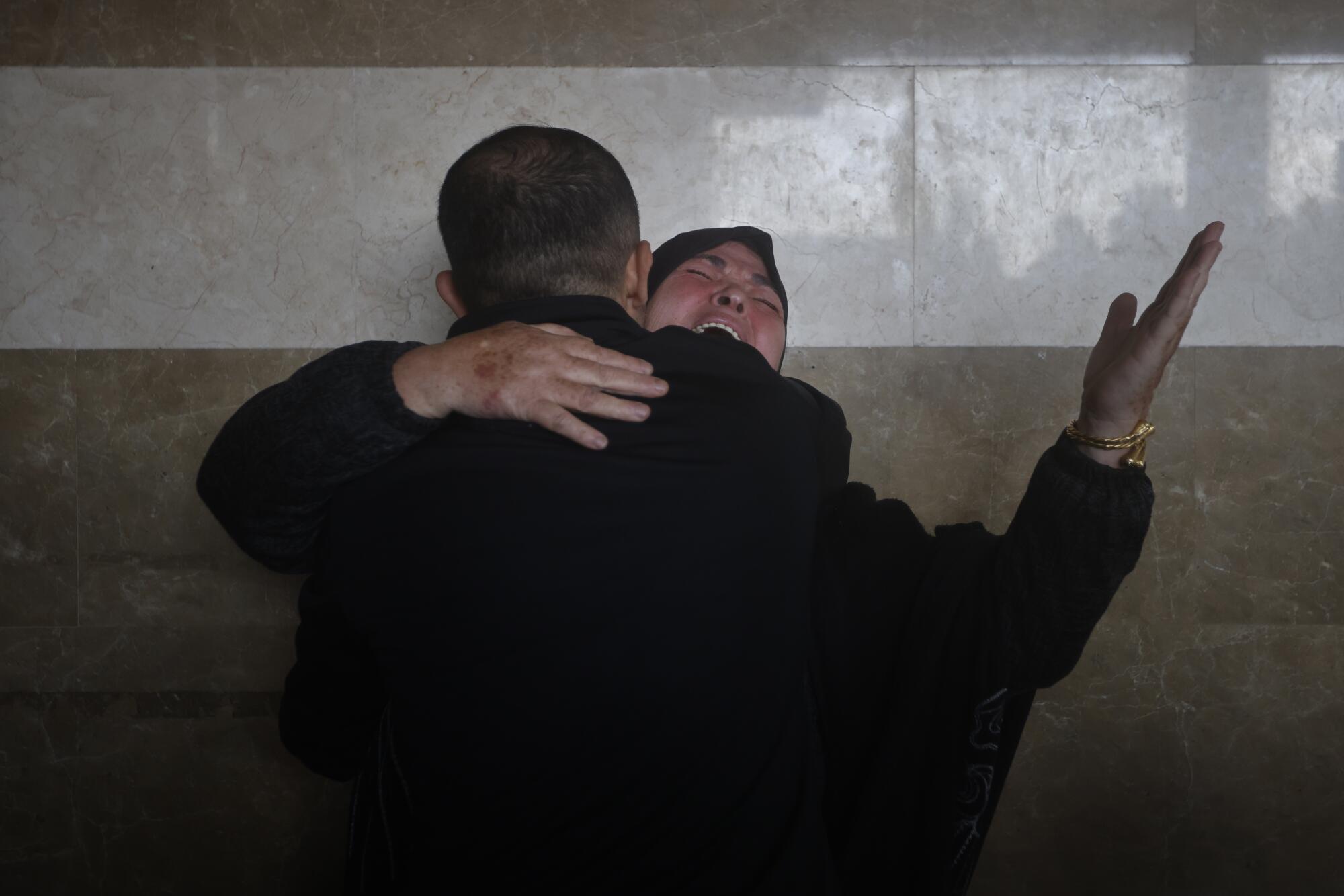
Israel has sealed Gaza off to all but a trickle of humanitarian aid, and U.N. agencies have struggled to distribute it since the offensive expanded to the south because of fighting and road closures. Almost no aid has reached the north since the start of the war.
Israel might have hoped that the war and its hardships would turn Palestinians against Hamas, hastening its demise, but as with previous rounds of violence, it seems to be having the opposite effect.
A poll conducted by the Palestinian Center for Policy and Survey Research found 44% of respondents in the occupied West Bank said they supported Hamas, up from just 12% in September. In Gaza, the militants had 42% support, up from 38% three months ago.
Several viral videos of Israeli soldiers behaving maliciously in Gaza have emerged in recent days, creating a headache for the Israeli military.
That’s still a minority in both territories. But even many Palestinians who do not share Hamas’ commitment to destroying Israel and oppose its attacks on civilians see it as resisting Israel’s decades-old occupation of lands they want for a future state.
The poll showed overwhelming rejection of Abbas, with nearly 90% saying he must resign. The 88-year-old leader’s Palestinian Authority administration, which is supported by Western countries and governs parts of the West Bank, is widely seen by Palestinians as a corrupt and autocratic accomplice to the occupation because it works with Israel to suppress Hamas and other militant groups.
The U.S. wants Abbas’ internationally recognized Palestinian Authority to also govern Gaza, which it lost to Hamas in a week of street fighting in 2007. The U.S. also wants to revive the long-defunct peace process to negotiate the creation of a Palestinian state.
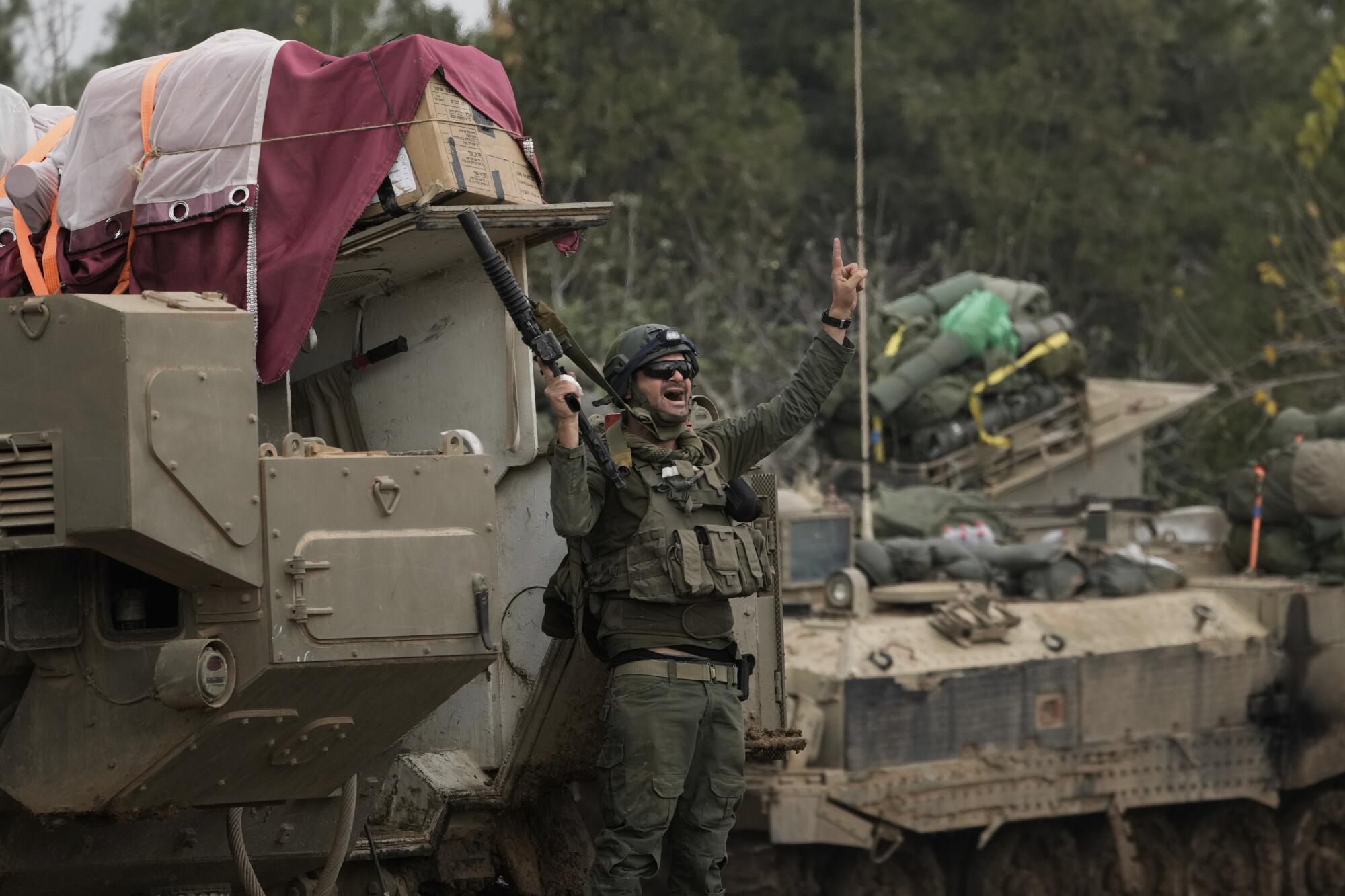
Netanyahu’s government is firmly opposed to Palestinian statehood and has said it will maintain open-ended security control over Gaza.
Hamas’ exiled leader, Ismail Haniyeh, who is based in Qatar, said late Wednesday that any plans for Gaza that do not involve Hamas are an “illusion and mirage,” though he said the group was open to another truce.
More to Read
Sign up for Essential California
The most important California stories and recommendations in your inbox every morning.
You may occasionally receive promotional content from the Los Angeles Times.
